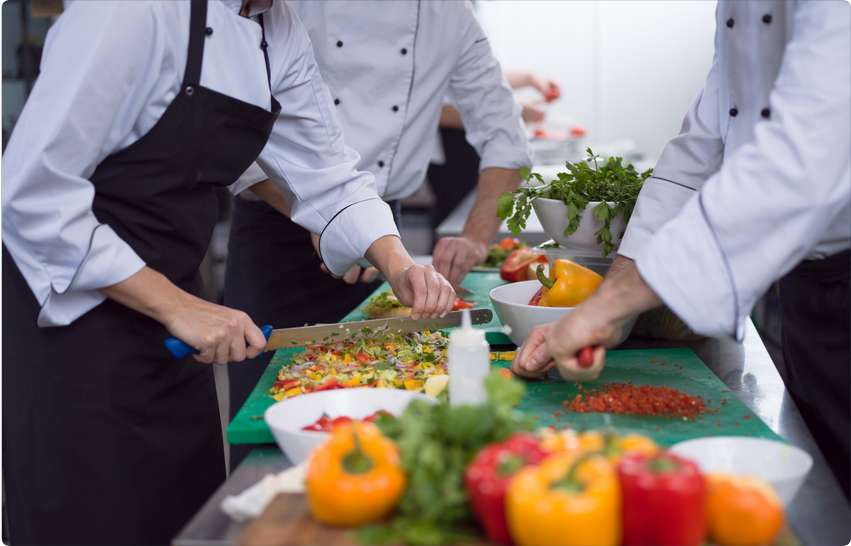Remember the awkward corporate retreats of the past? The trust falls, rope courses, and icebreaker games that made everyone cringe? 😬 There’s a new player in the team building arena that’s actually getting employees excited: cooking classes. Companies across the country are trading blindfolds and obstacle courses for aprons and chef’s knives – and the results are remarkable.
Why Traditional Team Building Falls Flat 📉
Let’s be honest: traditional team building activities often feel forced and artificial. When was the last time you needed to catch a falling coworker or navigate a rope course in your actual job? These activities, while well-intentioned, rarely translate to improved workplace dynamics.
Common problems with traditional corporate team building:
- Activities feel disconnected from real work scenarios
- Introverted employees may feel uncomfortable or excluded
- One-size-fits-all approaches don’t account for diverse personalities
- Limited practical application to daily work challenges
- Often viewed as mandatory “fun” rather than genuine team development
The Rise of Culinary Team Building 🍳
Enter cooking-based team building – an approach that’s gaining traction among forward-thinking companies. Unlike trust falls, cooking together mirrors many aspects of successful workplace collaboration: communication, delegation, problem-solving under pressure, and working toward a shared goal.
Why Cooking Classes Work Better ✨
1. Natural Collaboration 🤝
Cooking inherently requires teamwork. Someone needs to prep vegetables while another manages the sauce. Team members naturally fall into complementary roles, just like they do in successful work projects.
2. Real Communication Skills 💬
In a busy kitchen, clear communication isn’t optional – it’s essential. Teams quickly learn to give precise instructions, listen actively, and coordinate timing. These are the same skills needed in effective meetings and project management.
3. Inclusive for All Personalities
Unlike high-energy trust exercises, cooking accommodates different comfort levels. Introverts can contribute meaningfully without being pushed into uncomfortable social situations, while extroverts can take leadership roles naturally.
4. Immediate, Shared Rewards 🍽️
The best part? Everyone gets to enjoy the fruits of their labor together. There’s something uniquely satisfying about sitting down to eat a meal you’ve created as a team.
The Business Case for Culinary Team Building 📊
Measurable Benefits Companies Are Seeing
Improved Communication (73% of participants) 📈
Teams report better information sharing and clearer project discussions following cooking-based team building sessions. The practice of coordinating in a kitchen environment translates directly to improved workplace communication.
Enhanced Problem-Solving Skills (68% of participants) 🧩
Cooking presents real-time challenges that require quick thinking and adaptation. When the sauce breaks or timing goes awry, teams must pivot quickly – a skill that’s invaluable in fast-paced work environments.
Stronger Interdepartmental Relationships (81% of participants) 🌉
Mixing employees from different departments in cooking teams breaks down silos. Marketing team members working alongside IT staff to create a perfect risotto often discover they have more in common than they thought.
Increased Employee Engagement (76% of participants) ⭐
Unlike mandatory trust exercises, employees actually look forward to cooking team building events. This positive anticipation creates better outcomes and longer-lasting team improvements.
What a Corporate Cooking Team Building Session Looks Like 👩🍳
The Structure
Pre-Session Planning (30 minutes) 📋
Teams are briefed on the menu and divided into cooking stations. This mirrors project kickoff meetings where roles and responsibilities are established.
Active Cooking Phase (90 minutes) 🔥
Teams work together to prepare a multi-course meal. Instructors facilitate but don’t lead, allowing natural team dynamics to emerge and develop.
Shared Meal & Reflection (45 minutes) 🍷
Everyone enjoys the meal together while discussing what they learned about communication, leadership, and collaboration during the cooking process.
Popular Corporate Menu Options
- Italian Focus 🇮🇹: Teams master pasta making, sauce coordination, and timing multiple dishes
- Asian Fusion 🥢: Emphasizes precision, timing, and coordinated cooking techniques
- Farm-to-Table 🌱: Highlights resource management and sustainable practices
- Competition Style 🏆: Multiple teams create the same dishes with friendly rivalry

Success Stories from the Corporate Kitchen 🌟
Tech Startup Transformation 💻
A 50-person software company was struggling with communication between their development and sales teams. After a series of monthly cooking team building sessions, they reported a 40% decrease in project miscommunications and significantly improved cross-departmental relationships.
Healthcare Administration Breakthrough 🏥
A hospital administration team used cooking classes to improve their high-stress decision making. The controlled pressure of coordinating multiple dishes helped them develop better crisis communication skills, which directly improved their emergency response protocols.
Manufacturing Leadership Development 🏭
A manufacturing company used advanced cooking techniques to develop leadership skills in their supervisory staff. Managing a complex meal service helped supervisors learn to delegate effectively while maintaining quality standards.
Choosing the Right Culinary Team Building Experience 🎯
Consider Your Team’s Needs
For Communication Issues: Focus on complex, multi-component meals that require constant coordination
For Leadership Development: Choose hierarchical cooking experiences with clear head chef and sous chef roles
For Cross-Department Integration: Mix teams randomly and focus on collaborative dishes
For Stress Management: Select comfort food menus that emphasize enjoyment over competition
What to Look for in a Corporate Cooking Class Provider ✅
- Professional facilitators who understand business objectives
- Flexible menu options that match your team’s dietary needs and preferences
- Debriefing sessions that connect cooking experiences to workplace applications
- Scalable programs that can accommodate different group sizes
- Follow-up resources to reinforce learned skills back in the office
The Future of Corporate Team Building 🚀
As companies increasingly recognize the limitations of traditional team building activities, culinary experiences are becoming the go-to choice for meaningful team development. The combination of practical skill-building, natural collaboration, and immediate gratification makes cooking classes uniquely effective for modern workplace challenges.
Ready to Transform Your Team? 💪
The question isn’t whether your team needs better collaboration – it’s whether you’re ready to try something that actually works. While your competitors are still doing trust falls, your team could be building real skills, stronger relationships, and better communication through the shared experience of creating something delicious together.
The next time your team needs a boost, skip the rope course and head to the kitchen. Your employees (and your bottom line) will thank you. 🙌



No comment